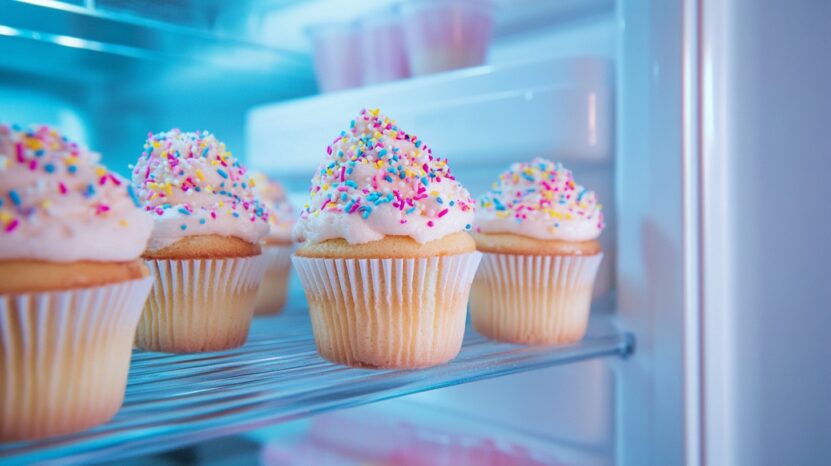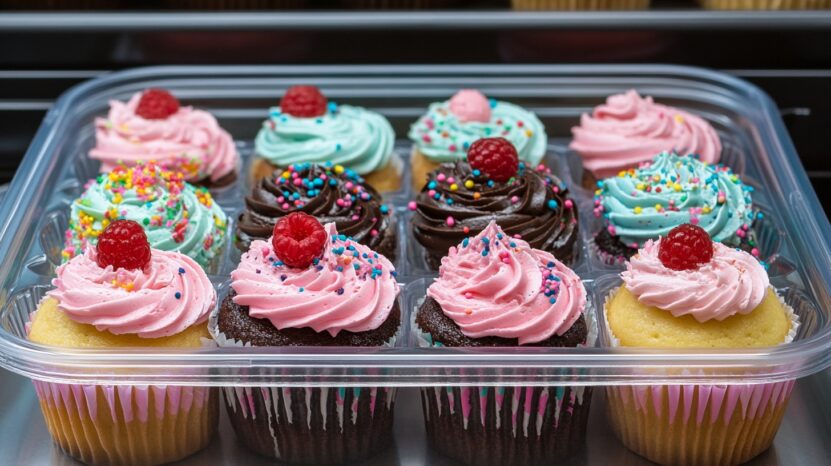
Share Post:
After spending years as a master chef and expert baker, I am constantly drawn into the heart of gastronomic debates.
One such discussion that is particularly captivating is, “Do Baked by Melissa cupcakes need to be refrigerated?”
As someone who appreciates the fine artistry that goes into creating these bite-sized delights, this is a topic I can sink my teeth into.
Let’s get into it, shall we?
When Refrigeration Makes Sense
Despite its potential drawbacks, there are certain instances when refrigerating a Baked by Melissa cupcake is not only sensible but necessary.
- Perishable Toppings: If they are frosted with cream cheese, whipped cream, or any other perishable toppings, refrigeration becomes essential to prevent spoilage.
- Hot Weather Conditions: In situations where the ambient temperature is too hot, refrigerating cupcakes is advisable. High temperatures can cause the frosting to melt, ruining the presentation and making it messy to handle.
When refrigerating cupcakes, always ensure they are stored in an airtight container to retain as much moisture as possible. This helps mitigate the drying effects of refrigeration.
However, to enjoy the cupcakes at their best, it’s important to bring them back to room temperature before eating.
It allows them to regain their natural softness and enhance the flavor profile, ensuring they are just as enjoyable as they were fresh out of the oven.

The Refrigeration Process
The decision to refrigerate cupcakes, as with any baked good, is often debated. Refrigeration offers the advantage of slowing down bacterial growth and extending the shelf life of food, but it also alters the texture and flavor of some items, cupcakes included.
- Moisture Loss: Refrigerators tend to pull moisture from anything stored inside. For Baked by Melissa cupcakes, which are already small and delicate, this can quickly turn a soft and fluffy treat into a dry, crumbly disappointment.
- Condensation Issues: Another challenge with refrigeration is temperature fluctuation. When cupcakes are removed from the fridge and left to return to room temperature, condensation often forms on the surface.
To minimize these issues, cupcakes should be properly covered or wrapped in an airtight container before being placed in the fridge. This helps reduce the amount of moisture lost and prevents the cupcakes from absorbing any unwanted odors from other food items.
Breaking Down the Ingredients
A typical Baked by Melissa cupcake is a small masterpiece, each one packed with a symphony of rich flavors and textures in just a single bite.
These cupcakes, though tiny, are built on essential ingredients that give them their signature taste and character.
Let’s break down the core components that make these bite-sized delights irresistible:
| Ingredient | Role in Baking |
|---|---|
| Flour | Provides structure and form. |
| Sugar | Sweetens and aids browning. |
| Eggs | Binds, leavens, and adds richness. |
| Butter | Adds moisture and helps rise. |
These four ingredients form the foundation of the cupcake. However, how they are measured, mixed, and baked is what ultimately defines the taste, texture, and overall success of the final product.
The precision in combining these ingredients is what elevates an ordinary cupcake into an extraordinary treat.
Storage Conditions for Baked Goods

Once cupcakes are baked, their quality is at its peak for about one to two days when stored at room temperature.
However, as time progresses, the freshness and texture of cupcakes can decline due to several factors, including exposure to:
- Air
- Humidity
- Fluctuations in temperature
These external elements can cause cupcakes to dry out, lose their softness, or even develop an undesirable texture.
When it comes to Baked by Melissa cupcakes, their miniature size makes them especially vulnerable to rapid moisture loss.
The smaller surface area means they dry out faster than regular-sized cupcakes, making proper storage even more essential.
Given their delicate structure, one might assume that refrigeration would be the ideal solution to preserve freshness.
After all, cool temperatures slow down the aging process of many foods. However, cupcakes are not always suited to the refrigerator environment.
Best Practices For Storing
Now that we’ve explored the pros and cons of refrigerating Baked by Melissa cupcakes, it’s essential to discuss the best practices for storing them to maintain their freshness, flavor, and texture.
Proper storage is key to ensuring that these tiny treats remain as delightful as when they were first baked.

Storing at Room Temperature
If you plan to enjoy your cupcakes within a day or two, storing them at room temperature is often the best choice.
- Use an Airtight Container: To keep them fresh, always store them in an airtight container.
- Avoid Direct Sunlight: It’s important to store the cupcakes in a cool, shaded area, away from direct sunlight.
- Humidity Control: While room temperature is fine, excessive humidity can also impact the freshness.
Storing in the Refrigerator
If you need to store your cupcakes for more than a couple of days, refrigeration becomes necessary.
- Store in Airtight Containers: Much like storing at room temperature, airtight containers are crucial in the refrigerator.
- Protect from Absorbing Odors: Cupcakes stored in the refrigerator can sometimes absorb strong odors from other foods.
- Allow Time to Thaw: Before serving, always bring refrigerated cupcakes back to room temperature. Allow them to sit out for 30 minutes to an hour before eating to restore their original softness and enhance the flavors.
The Bottom Line
In most cases, Baked by Melissa cupcakes do not need to be refrigerated if they will be consumed within a day or two. Their small size and delicate nature make them best enjoyed fresh at room temperature, where their texture and flavor are at their peak.
If your cupcakes are topped with perishable ingredients like cream cheese or if the surrounding environment is warm, refrigeration becomes necessary to prevent spoilage.
For long-term storage, freezing is a superior option that locks in freshness for an extended period.








